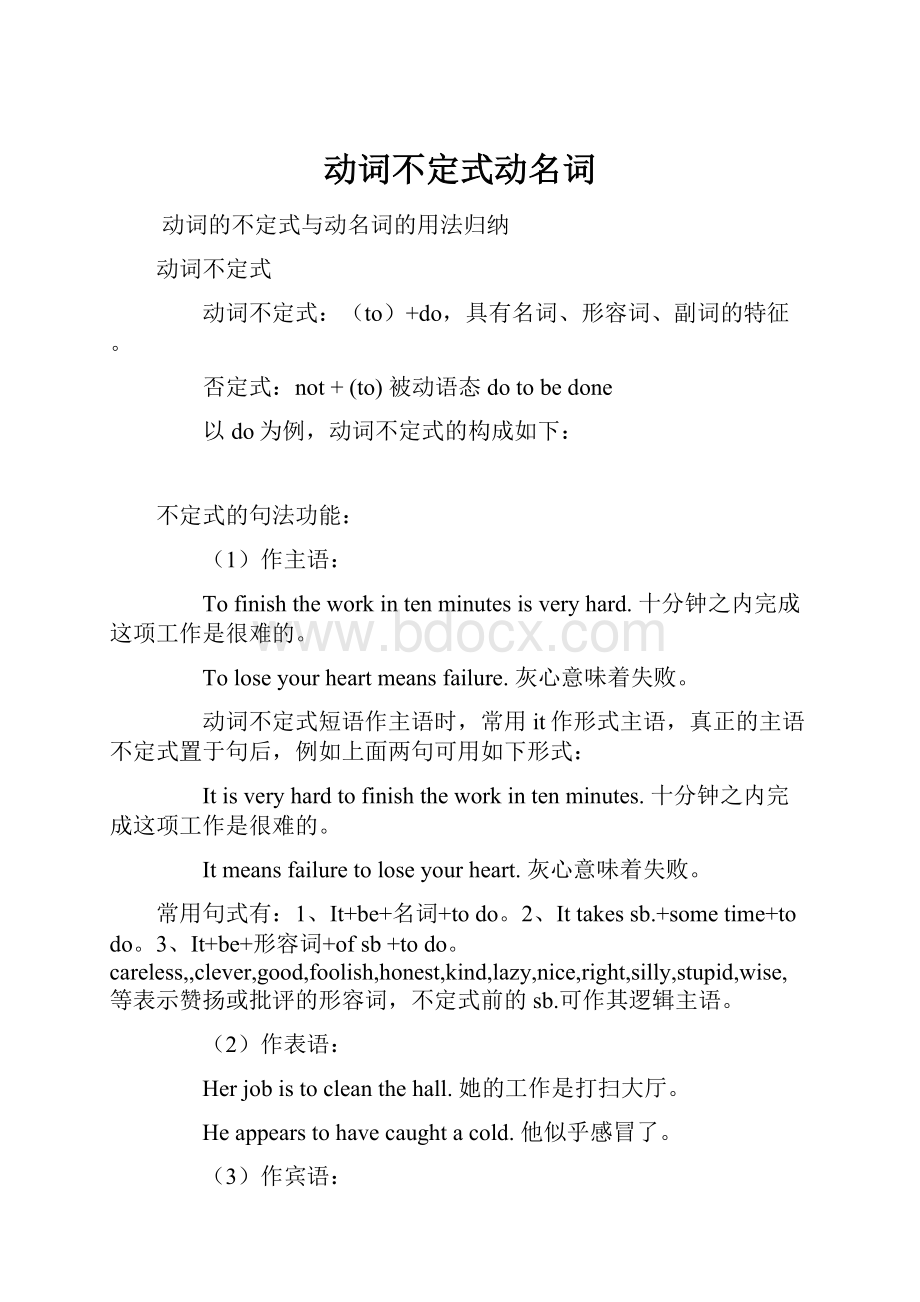动词不定式动名词.docx
《动词不定式动名词.docx》由会员分享,可在线阅读,更多相关《动词不定式动名词.docx(10页珍藏版)》请在冰豆网上搜索。

动词不定式动名词
动词的不定式与动名词的用法归纳
动词不定式
动词不定式:
(to)+do,具有名词、形容词、副词的特征。
否定式:
not+(to)被动语态dotobedone
以do为例,动词不定式的构成如下:
不定式的句法功能:
(1)作主语:
Tofinishtheworkintenminutesisveryhard.十分钟之内完成这项工作是很难的。
Toloseyourheartmeansfailure.灰心意味着失败。
动词不定式短语作主语时,常用it作形式主语,真正的主语不定式置于句后,例如上面两句可用如下形式:
Itisveryhardtofinishtheworkintenminutes.十分钟之内完成这项工作是很难的。
Itmeansfailuretoloseyourheart.灰心意味着失败。
常用句式有:
1、It+be+名词+todo。
2、Ittakessb.+sometime+todo。
3、It+be+形容词+ofsb+todo。
careless,,clever,good,foolish,honest,kind,lazy,nice,right,silly,stupid,wise,等表示赞扬或批评的形容词,不定式前的sb.可作其逻辑主语。
(2)作表语:
Herjobistocleanthehall.她的工作是打扫大厅。
Heappearstohavecaughtacold.他似乎感冒了。
(3)作宾语:
常与不定式做宾语连用的动词有:
want,hope,wish,offer,fail,plan,learn,pretend,refuse,manage,help,agree,promise,prefer,如果不定式(宾语)后面有宾语补足语,则用it作形式宾语,真正的宾语(不定式)后置,放在宾语补足语后面,例如:
MarxfounditimportanttostudythesituationinRussia.马克思发现研究俄国的情况是很重要的。
动词不定式也可充当介词宾语,如:
Ihavenochoicebuttostayhere.我只能留在这里,别无选择。
HedidnothinglastSundaybutrepairhisbike.他上周日除了修他的自行车什么也没干。
动词不定式前有时可与疑问词连用,如:
HegaveussomeadviceonhowtolearnEnglish.他给了我们一些学英语的建议。
(4)作宾语补足语:
在复合宾语中,动词不定式可充当宾语补足语,如下动词常跟这种复合宾语:
want,wish,ask,tell,order,beg,permit,help,advise,persuade,allow,prepare,cause,force,callon,waitfor,invite.
有些动词如make,let,see,watch,hear,feel,have等与不带有to的不定式连用,但改为被动语态时,不定式要加to,如:
Isawhimcrosstheroad.我看见他横过公路。
Hewasseentocrosstheroad.他被我看见横过公路。
(5)作定语:
动词不定式作定语,放在所修饰的名词或代词后与所修饰名词有如下关系:
①动宾关系:
Ihaveameetingtoattend.我有一个会议要出席。
注意:
不定式为不及物动词时,所修饰的名词如果是地点、工具等,应有必要的介词,如:
Hefoundagoodhousetolivein.他找到了一个居住的好房子。
Thechildhasnothingtoworryabout.这个孩子无忧无虑。
Whatdidyouopenitwith?
你用什么打开它?
如果不定式修饰time,place,way,可以省略介词:
Hehasnoplacetolive.他无处安身。
Thisisthebestwaytoworkoutthisproblem.这是解决这个问题的最好办法。
②说明所修饰名词的内容:
Wehavemadeaplantofinishthework.我们制定了一个完成工作的计划。
③被修饰名词是不定式逻辑主语:
Heisthefirsttogethere.他第一个来到这儿。
(6)作状语:
①表目的:
Heworkeddayandnighttogetthemoney.他夜以继日地工作来赚钱。
Shesoldherhairtobuythewatchchain.她卖掉了自己的头发来买那条表链。
注意不定式放句首时,逻辑主语与句子主语要一致:
wrong:
Tosavemoney,everymeanshasbeentried.
right:
Tosavemoney,hehastriedeverymeans.为了省钱,他使出了浑身解数。
wrong:
TolearnEnglishwell,adictionaryisneeded.
right:
TolearnEnglishwell,heneedsadictionary.为了学好英语,他需要一本词典。
②表结果(往往是与预期愿望相反的结果意料之外):
常放在neveronly后
Hearrivedlateonlytofindthetrainhadgone.他来晚了,只见火车已经走了。
Ivisitedhimonlytofindhimout.我去拜访他,只见他出去了。
③表原因:
常放在形容词后面
Theywereverysadtohearthenews.他们听到这条新闻非常伤心。
(7)作目的状语:
既可以放在句首,也可以放在句尾
Totellyouthetruth,Idon'tlikethewayhetalked.说实话,我不喜欢他讲话的方式。
(8)不定式的省略:
保留to省略do动词。
Ifyoudon'twanttodoit,youdon'tneedto.如果你不想做这件事,你就不必做。
(9)不定式的并列:
第二个不定式可省略to。
Hewishedtostudymedicineandbecomeadoctor.他希望学医并成为医生。
动名词的句法功能:
(1)作主语:
Readingaloudisveryhelpful.朗读是很有好处的。
Collectingstampsisinteresting.集邮很有趣。
当动名词短语作主语时常用it作形式主语。
It'snousequarrelling.争吵是没用的。
(2)作表语:
Intheantcity,thequeen'sjobislayingeggs.
在蚂蚁王国,蚁后的工作是产卵。
(3)作宾语:
Theyhaven'tfinishedbuildingthedam.他们还没有建好大坝。
Wehavetopreventtheairfrombeingpolluted.
我们必须阻止空气被污染。
注意,动名词作宾语时,若跟有宾语补足语,则常用形式宾语it,例如:
Wefounditnogoodmakingfunofothers.我们发现取笑他人不好。
要记住如下动词及短语只跟动名词作宾语:
enjoy,finish,suggest,avoid(避免),excuse,delay,imagine,keep,miss,consider,admit(承认),deny(否认),mind,permit,forbid,practise,risk(冒险),appreciate(感激),bebusy,beworth,feellike,can'tstand,can'thelp(情不自禁地),thinkof,dreamof,befondof,prevent…(from),keep…from,stop…(from),protect…from,setabout,beengagedin,spend…(in),succeedin,beusedto,lookforwardto,objectto,payattentionto,insiston,feellike
注意事项
一、不定式
1.“to”是不定式符号还是介词,下列短语中的to都是介词。
agreetoobjecttocloseto,cometo,leadto,referto,
equalto,familiarto,pointto,thankto,devoteto,nextto,belongto,beusedto,lookforwardto
2.带to还是不带to
Ihavenochoicebuttogivein
Icannotdoanythingbutgivein
Isawhimentertheclassroom.
(但是:
Hewasseentoentertheclassroom.)
3.动词不定式逻辑主语是由for作为标记的。
但是有时用of.
区别:
当使用for时,句中形容词修饰的是不定式;而用of时,句中形容词修饰逻辑主语。
It’snecessaryforyoutostudyhard.(necessary修饰tostudyhard,表示学习努力是有必要的)
It’sfoolishofhimtodoit.(foolish修饰逻辑主语him)
与of连用的形容词有:
good,kind,nice,wise,clever,foolish,right,wrong,careful,careless,polite,…
与for连用的通常是一些表示可能性、难易程度、必要性等含义的形容词:
possible,impossible,easy,hard,difficult,necessary,…
4.后接不定式作宾语的动词有:
want,hope,wish,like,begin,try,need,forget,agree,know,promise,teach,refuse,help,arrange,dare,decide,determine,fail,manage,offer,prepare,continue,ask,mean,choose,expectetc.
需要宾语补足语的动词不能用动词不定式直接做介词的宾语,而要用it做形式宾语。
例如:
通常不说Wethinktoobeythelawsisimportant.而说Wethinkitimportanttoobeythelaws.
5.不定式作宾语补足语时省略to的情况:
若不定式前的谓语动词是使役动词make,let,have(表示“让、使”)、感官动词see,watch,lookat,observe,notice,hear,listento,feel时,不定式符号to可以省略。
这些动词亦可总结为口诀:
“三使五看两听一感觉”。
例如:
Let's(to)go!
走吧!
Hesawthethief(to)stealalady’scellphone.
注:
改为被动句时要把to还原,例如:
Thethiefwasseentostealalady’scellphone.
6.不定式作定语,应注意两种关系:
1)动宾关系:
Hehasalotofmeetingtoattend.
Pleaselendmesomethingtowritewith.
Heislookingforaroomtolive
Heislookingforaroomtolivein.
Hehasnomoneyandnoplace
tolive(in).
Ithinkthebestwaytotravel(by)isonfoot.
Thereisnotimetothink(about).
2)主谓关系:
Sheisalwaysthelast(person)tospeakatthemeeting.
7.不定式作状语,可以有以下几种意义:
1)原因
Heisluckytogethereontime.
这种结构中常用的形容词有:
happy,glad,delighted,pleased,sorry,eager,anxious.lucky,fortunate,proud,angrysurprised,frightened,disappointed,ready,clever,foolish,worthy
2)目的
Hecametohelpmewithmymaths.
3)结果
Ihurriedtogetthereonlytofindhimout.
Thebookistoohardfortheboytoread.
Heisoldenoughtogotoschool.
8.不定式作补足语
Isawhimplayinthestreetjustnow.
能跟不带to的不定式作补足语的动词有:
see,feel,hear,listento,lookat,watch,let,havemake,observe,notice
注:
当这些词为被动式时,不定式要带to,如:
Hewasseentoplayinthestreetjustnow.
二.动名词
1.There’snotellingwhatwillhappen.
=It’simpossibletotellwhatwillhappen.
=Noonecantellwhatwillhappen.
2.It’snousetalkingwithhim.
It’snogoodspeakingtothemlikethat.
3.There’ssomedifficulty(in)doing…
在此句型中,difficulty可以由以下单词替换:
trouble,problem,fun,pleasure,agoodtime,ahardtime
注意以下几个问题:
1.下列动词后跟不定式与跟动名词作宾语意义有区别,
forgettodo…忘记要做某事forgetdoing…忘记做过了某事
remembertodo…记住要做某事rememberdoing…记着曾做过某事
meantodo…打算要做某事meandoing…意味着做了某事
regrettodo…(do指代有限的几个词,如say、tell)很抱歉要告诉你…
regretdoing…后悔做过某事
can’thelptodo…不能帮助做某事
can’thelpdoing…情不自禁做某事
trytodo…尽力去做某事trydoing试着做某事
learntodo…学着去做某事learndoing…学会做某事
stoptodo…停下来去做(另一件事)stopdoing…停止做某事
goontodo…接着做(另外一件事)goondoing…继续做某事
usedtodo…过去做某事beusedtodoing…习惯做某事
2.动名词作定语与现在分词作定语意义有区别
动名词作定语表达n+fordoing的含义
现在分词作定语表达n+which(who)bedoing的含义
如:
asleepingcar=acarforsleeping
arunninghorse=ahorsewhichisrunning
前者是动名词,后者是现在分词
又如:
drinkingwater,walkingstickrunningwater,sleepingboy
3.动名词的逻辑主语:
动名词的逻辑主语为代词或名词的所有格形式。
例如:
Hiscomingmadeusveryhappy.
4.动名词主动形式表被动的情况:
needdoing,wantdoing,requiredoing
例如:
Thisroomneedspainting.这个房间需要粉刷。
6.只能跟动名词作宾语的动词:
admit,avoid,advise,consider,delay,deny,enjoy,escape,excuse,fancy,finish,complete,forbid,imagine,mind,miss,permit.practise,require,suggest,risk,keep,taketo,lookforwardto,getdownto,feellike,can’thelp,can’tstand,beusedto,insiston,succeedin,setabout,giveup,include,